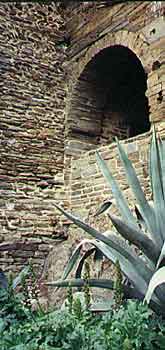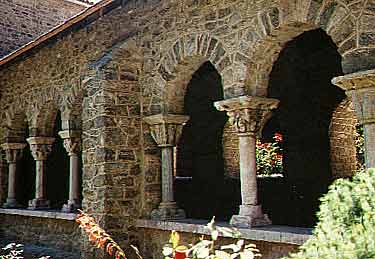THOMAS MERTON IN FRANCE
 |
Prades 2000
By Ginny Bear
Redmond, Washington
Prades' first spring in the new millennium was well underway as thirty Merton pilgrims arrived for a nine-day program to Thomas Merton's birthplace. A little further up the slopes of Mt. Canigou, the flowers had already dropped from the peach trees on the mountain side of the Abbey of St. Michel de Cuxa, and the iris garden on the town side was a mass of colour.
Down the hill, 6,000-inhabitant Prades retains its ancient charm. Although the twenty-first century has arrived (to the relief of those who patronized the convenient commercial Internet access shop), the town itself remains the embodiment of a world that was civilized long before Europeans discovered the New World. I had researched the area in books and on the Internet in advance, but it was even more beautiful than promised.
Prades is located in the south of France, in a valley where several rivers meet on their way to the Mediterranean, in the Pyrenees-Orientales administrative department. It is also part of Catalonia, a Catalan-speaking region on both sides of the nearby Spanish border. Thomas Merton was born in Prades, eighty-five years before our visit, on the second floor of an ordinary building, at an unpretentious intersection of Prades' narrow streets. Although his artist parents had hoped Prades would be a haven, the nearing of the conflicts of WW I as well as money problems led them to the United States a year later. Merton returned to southern France with his father from the ages of 10-13, and later, although he never returned again, kept alive his memories of France as well as his fluency in the language.
 |
Donald Grayston and Judith Hardcastle were our tour leaders, competently arranging the academic content as well as serving as regional experts, answering questions ranging from advising those who had hoped to scale Mt. Canigou (not this year, the snow line was still too low), to those who needed to know what kinds of medicine were available at the local pharmacy. Another key person, although not listed on the brochure, was Christine Hicks, of the Prades Tourist Office, English but long resident in Prades. I do not think anyone will soon forget the barbecue held at her home for the local and international Merton Society members, with an endless parade of meats from the grill, and remarkable demonstrations of agility in drinking from long-necked pitchers held high in the air!
Three well-known Merton scholars were part of the pilgrimage: the already mentioned tour leader Rev. Donald Grayston (Anglican), author of several essays and articles on Merton, Fr. George Kilcourse (Roman Catholic), recipient of the 1995 book award from the ITMS for Ace of Freedoms: Thomas Merton's Christ, and Sr. Donna Kristoff, OSU (Roman Catholic), artist, ITMS board member, and Merton researcher and teacher. It was a unique opportunity to engage with them both formally and as fellow pilgrims.
The rest of us ranged from the irrepressible Sr. Michelle, 50-years professed pride of the Ursulines, to three articulate college students, with a good variety of people in between. The interchange of views was sometimes bracing, but new friendships were made, and each participant had cause to be grateful to that "great and mischievous monk" who drew us all to Prades.
 |
Time passed at a different speed in Prades, and we tried to adjust. Lunch hour was longer than an hour, but that didn't mean we could wander aimlessly through Prades looking for lunch, since many of the shops closed at mid day. It took a while to understand when we needed to hurry, and when we didn't. Group meals went on for hours sometimes, as we sampled the cuisine of the area and got to know each other better. Other times, meals were opportunities to go off individually or in small groups, providing occasions to try out high school or more recently acquired French. Although some spoke English, any sincere effort to speak French seemed appreciated by the tolerant townspeople, already accustomed to tourists such as those who come to the annual Pablo Casals music festival.
 |
The pilgrimage closed with a last delicious dinner at the hotel, with a clown who did not need English to entertain, and with awards made appropriately and humorously to each person. I don't remember all of the awards, but mine was "Brave Vegetarian", and another participant was presented with and graciously wore an appropriately monogrammed papal miter! The following morning we dispersed in all directions of the compass, all grateful for nine precious days in Merton's French homeland.

A year later, I still savor the beauty of Prades and southern France, far from the rolling fields and knobs of Kentucky where Merton spent the second half of his life. But paradoxically, his entrance into the enclosed monastery only strengthened his French ties. Merton could not come to France, so France came to him. The Cistercian order originated in France centuries ago, and it was a matter of monastic obedience for Merton to work with French language materials as well as to serve as French interpreter for visitors. I suspect that this obedience must have also had an element of joy, judging by the relish with which he discusses all things French in his writings.
We too, of the Merton Pilgrimage, gained a taste of that French part of Merton's joy.
Simon Fraser University will be offering another 'Thomas Merton in France' pilgrimage in May, 2004.
